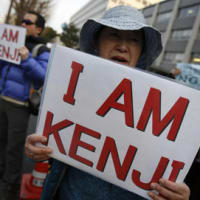Avoiding Last Place: Some Things We Don't Outgrow
最後尾回避行動:ある逃れられない心理
by NPR Staff
東北の震災の惨状に同情しつつも、「あれに比べれば俺たちはまだ恵まれている」と(もっと酷い状況にある人々のことを見て)自分を慰める心理もこれに類するのかも知れない。 絶対的な視点を持つのが悟りだが、これが並みの人間には難しい。この衆情を汲みながら、社会的な公正さを追及するのが政治家の仕事だから、もとより楽なはずがない。
September 4, 2011
People near the bottom of the socioeconomic ladder often oppose policies that help those below them, according to a new paper from the National Bureau of Economic Research. The phenomenon is called "last-place aversion."
Ilyana Kuziemko, one of the authors of the paper and an economics professor at Princeton University, tells NPR's Laura Sullivan that last-place aversion is what it sounds like.
社会経済階層の底辺近くの人々は、自分より下の階層の人々を助ける政策にしばしば反対するということが、国立経済研究所の新しい報告書で判明した。 この現象は「最後尾回避行動」と呼ばれている。
その報告書の著者の一人であり、プリンストン大学の経済学者であるイリヤナ・クジエンコはNPRのローラ・サリバンに「最後尾回避」はその文字通りの意味だと説明した。
"It's the basic human need to avoid feeling like we ourselves are in last place," she says. "Or maybe, put a bit more negatively, it's our need to feel like there's at least one person we can feel superior to or look down on."
「私たち自身が最後尾或いは最低だと感じたくないと思うのは人間の基本的な要求です。 多分、もっと嫌な表現をするとすれば、私たちには自分が優位に立っていると思えるか、見下す相手が少なくとも一人は必要だといいうことです。」
Kuziemko says it's similar to the childhood fear of being picked last in gym class. That feeling, she says, "probably doesn't go away just because we grow up."
クジエンコによると、それは子供たちが体操の授業でビリになるのを嫌がるのに似ているという。 「多分、この感情は子供が長じたからといって失われる感情ではないのです。」
She's had the idea in mind for a while. Kuziemko found last-place aversion throughout U.S. history, including during the era of Jim Crow laws. One study she found argues that Jim Crow was more important to poorer Southern whites than it was to the wealthier plantation class.
彼女は暫くして、ある類似例を思いついた。 クジエンコは、この最後尾回避行動がアメリカの歴史のなかでジジムクロウ法※の時代にみられることを発見した。 彼女が見つけたある研究によると、ジムクロウ法は、南部の裕福なプランテーション経営者ではなく、貧しい白人たちにとってより重要な意味を持っていたという。
※主に黒人の、一般公共施設の利用を禁止制限した法律を総称していう。(つまり貧しい白人にとって、自分たちが最下層ではないという認識要求を満たした。)
"The way I thought about it was, [these institutions] were really important for relatively poor whites so they could have permanently — and sort of officially — a group they could always look down on," Kuziemko says.
「私がそれについて考えたのは、これらの制度は比較的貧しい白人にとって、永久的に或いは公式に、自分たちが常に見下すことができる階層を持つことが出来たと言う意味で彼らにとって重要だったのです。」とクジエンコは説明する。
The National Bureau of Economic Research's study enlisted student and community volunteers. Each participant was given a unique amount of money that differed from the next person by $1. Then, everyone was given an additional $2. They were not allowed to keep the $2; they could only give it to the person just above them or the person just below them in wealth.
国立経済研究所は、学生と地域のボランティアを募って実験をした。 参加者各人には、まず隣の人と1ドルずつの差をつけた奇妙なお金の配分をして、さらに各人に2ドルずつ均等に与えた。 ただし、彼らはこの2ドルを自分にため込むことは許されず、自分の直ぐ上の(1ドル金持ち)か、或いは自分のすぐ下の(1ドル貧乏)にあげなければならないとされた。
Kuziemko says in this scenario, most people gave to the person with less money, since they would not have gained or lost money either way.
クジエンコによると、殆どの人は、より貧乏な下の人に、この2ドルをあげた。なぜなら、このシナリオでは、2ドルはどのみち保有できないわけだから、彼らはどちらにしても金を増やせないし、失うこともないからである。
The behavior was different, however, lower in the distribution. The second-to-last person gave his $2 to the richer person "almost half the time," she says. If he gave his $2 to the one person in the room with less money, he would also become the poorest person in the group — in last place.
しかしながら、配分の少なかった階層では行動は異なったのである。 つまり、下から二番目の階層の人々は、その2ドルを「半分以上のケースで」すぐ上の人に上げたのですと彼女は説明した。 もし、彼がこの2ドルを、その部屋のすぐ下の人にあげると、彼はその部屋では一番貧乏なグループに入ってしまいます。 そう最後尾です。
The researchers believe this happened "because it's so painful to have that one person below you jump over you."
Outside the laboratory, Kuziemko says, last-place aversion shows through in opinions about minimum wage. The researchers found that most people making relatively low wages believe the minimum wage should be increased.
研究者は何故このようなことが起きたのか次のように説明する。つまり「人々にとって自分の下の人が自分を飛び越えていくのはとても耐えきれないことなのです。」
この実験とは別に、クジエンコは「最後尾回避行動」は最低賃金についての意見の中にもみられるという。 調査員は最低賃金をあげるべきだとする比較的低所得者層の殆どの人々に、この傾向を発見した。
"But there was a real spike downward in support for increasing the minimum wage among people who were making just above it," she says. "There could be any number of things going on, but this is certainly consistent with their not wanting just the couple people below them who are still making the minimum wage to have the same wage that they do."
「最低賃金をあげることを支持するグループのなかで、最下層より少し上の階層に、統計上著しい支持の凹みが見られたのである。 この調査は何度が実施されたが、この傾向は一貫して、彼らが直ぐ下の者が彼らと同じ給与を受け取ることに抵抗を示したのです。」
Kuziemko has seen the paper interpreted in different ways, including on what she called "right-leaning blogs," which say it shows a lack of support for redistribution of wealth.
クジエンコは、この報告書の解釈を異なった風にみていた。 それは富の再配分の視点を欠いている「右傾化したブログ」と彼女が呼ぶものに対する見方と一緒である。
"[But] I think that another way of looking at it might be recognizing that there is a lot of status anxiety, specifically for people who are sort of lower in the distribution and to be sensitive to that," she says, "and maybe not being so sensitive to that undercuts support for redistribution among people who rationally, we think, should be supporting it."
「それに対する違った見方というのは、まず貧しい下層の人々には、ステイタスの心配が沢山あり、それについて敏感であらねばと認識すること。 そして理性的に(と我々が考える)再配分を支持する人々の中においての再配分のために支援を削ることに、そんなに神経質になる必要はないということです。」
最後尾回避行動:ある逃れられない心理
by NPR Staff
東北の震災の惨状に同情しつつも、「あれに比べれば俺たちはまだ恵まれている」と(もっと酷い状況にある人々のことを見て)自分を慰める心理もこれに類するのかも知れない。 絶対的な視点を持つのが悟りだが、これが並みの人間には難しい。この衆情を汲みながら、社会的な公正さを追及するのが政治家の仕事だから、もとより楽なはずがない。
September 4, 2011
People near the bottom of the socioeconomic ladder often oppose policies that help those below them, according to a new paper from the National Bureau of Economic Research. The phenomenon is called "last-place aversion."
Ilyana Kuziemko, one of the authors of the paper and an economics professor at Princeton University, tells NPR's Laura Sullivan that last-place aversion is what it sounds like.
社会経済階層の底辺近くの人々は、自分より下の階層の人々を助ける政策にしばしば反対するということが、国立経済研究所の新しい報告書で判明した。 この現象は「最後尾回避行動」と呼ばれている。
その報告書の著者の一人であり、プリンストン大学の経済学者であるイリヤナ・クジエンコはNPRのローラ・サリバンに「最後尾回避」はその文字通りの意味だと説明した。
"It's the basic human need to avoid feeling like we ourselves are in last place," she says. "Or maybe, put a bit more negatively, it's our need to feel like there's at least one person we can feel superior to or look down on."
「私たち自身が最後尾或いは最低だと感じたくないと思うのは人間の基本的な要求です。 多分、もっと嫌な表現をするとすれば、私たちには自分が優位に立っていると思えるか、見下す相手が少なくとも一人は必要だといいうことです。」
Kuziemko says it's similar to the childhood fear of being picked last in gym class. That feeling, she says, "probably doesn't go away just because we grow up."
クジエンコによると、それは子供たちが体操の授業でビリになるのを嫌がるのに似ているという。 「多分、この感情は子供が長じたからといって失われる感情ではないのです。」
She's had the idea in mind for a while. Kuziemko found last-place aversion throughout U.S. history, including during the era of Jim Crow laws. One study she found argues that Jim Crow was more important to poorer Southern whites than it was to the wealthier plantation class.
彼女は暫くして、ある類似例を思いついた。 クジエンコは、この最後尾回避行動がアメリカの歴史のなかでジジムクロウ法※の時代にみられることを発見した。 彼女が見つけたある研究によると、ジムクロウ法は、南部の裕福なプランテーション経営者ではなく、貧しい白人たちにとってより重要な意味を持っていたという。
※主に黒人の、一般公共施設の利用を禁止制限した法律を総称していう。(つまり貧しい白人にとって、自分たちが最下層ではないという認識要求を満たした。)
"The way I thought about it was, [these institutions] were really important for relatively poor whites so they could have permanently — and sort of officially — a group they could always look down on," Kuziemko says.
「私がそれについて考えたのは、これらの制度は比較的貧しい白人にとって、永久的に或いは公式に、自分たちが常に見下すことができる階層を持つことが出来たと言う意味で彼らにとって重要だったのです。」とクジエンコは説明する。
The National Bureau of Economic Research's study enlisted student and community volunteers. Each participant was given a unique amount of money that differed from the next person by $1. Then, everyone was given an additional $2. They were not allowed to keep the $2; they could only give it to the person just above them or the person just below them in wealth.
国立経済研究所は、学生と地域のボランティアを募って実験をした。 参加者各人には、まず隣の人と1ドルずつの差をつけた奇妙なお金の配分をして、さらに各人に2ドルずつ均等に与えた。 ただし、彼らはこの2ドルを自分にため込むことは許されず、自分の直ぐ上の(1ドル金持ち)か、或いは自分のすぐ下の(1ドル貧乏)にあげなければならないとされた。
Kuziemko says in this scenario, most people gave to the person with less money, since they would not have gained or lost money either way.
クジエンコによると、殆どの人は、より貧乏な下の人に、この2ドルをあげた。なぜなら、このシナリオでは、2ドルはどのみち保有できないわけだから、彼らはどちらにしても金を増やせないし、失うこともないからである。
The behavior was different, however, lower in the distribution. The second-to-last person gave his $2 to the richer person "almost half the time," she says. If he gave his $2 to the one person in the room with less money, he would also become the poorest person in the group — in last place.
しかしながら、配分の少なかった階層では行動は異なったのである。 つまり、下から二番目の階層の人々は、その2ドルを「半分以上のケースで」すぐ上の人に上げたのですと彼女は説明した。 もし、彼がこの2ドルを、その部屋のすぐ下の人にあげると、彼はその部屋では一番貧乏なグループに入ってしまいます。 そう最後尾です。
The researchers believe this happened "because it's so painful to have that one person below you jump over you."
Outside the laboratory, Kuziemko says, last-place aversion shows through in opinions about minimum wage. The researchers found that most people making relatively low wages believe the minimum wage should be increased.
研究者は何故このようなことが起きたのか次のように説明する。つまり「人々にとって自分の下の人が自分を飛び越えていくのはとても耐えきれないことなのです。」
この実験とは別に、クジエンコは「最後尾回避行動」は最低賃金についての意見の中にもみられるという。 調査員は最低賃金をあげるべきだとする比較的低所得者層の殆どの人々に、この傾向を発見した。
"But there was a real spike downward in support for increasing the minimum wage among people who were making just above it," she says. "There could be any number of things going on, but this is certainly consistent with their not wanting just the couple people below them who are still making the minimum wage to have the same wage that they do."
「最低賃金をあげることを支持するグループのなかで、最下層より少し上の階層に、統計上著しい支持の凹みが見られたのである。 この調査は何度が実施されたが、この傾向は一貫して、彼らが直ぐ下の者が彼らと同じ給与を受け取ることに抵抗を示したのです。」
Kuziemko has seen the paper interpreted in different ways, including on what she called "right-leaning blogs," which say it shows a lack of support for redistribution of wealth.
クジエンコは、この報告書の解釈を異なった風にみていた。 それは富の再配分の視点を欠いている「右傾化したブログ」と彼女が呼ぶものに対する見方と一緒である。
"[But] I think that another way of looking at it might be recognizing that there is a lot of status anxiety, specifically for people who are sort of lower in the distribution and to be sensitive to that," she says, "and maybe not being so sensitive to that undercuts support for redistribution among people who rationally, we think, should be supporting it."
「それに対する違った見方というのは、まず貧しい下層の人々には、ステイタスの心配が沢山あり、それについて敏感であらねばと認識すること。 そして理性的に(と我々が考える)再配分を支持する人々の中においての再配分のために支援を削ることに、そんなに神経質になる必要はないということです。」




















※コメント投稿者のブログIDはブログ作成者のみに通知されます